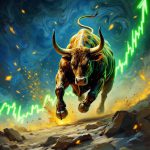
What is Texas Tea? Liquid Gold for Big Gains
August 19, 2024
Introduction: The History and Evolution of “Texas Tea
Texas Tea, a term used to describe crude oil, has been a pivotal element in Texas’s economic and cultural landscape and the global economy for over a century.
The story of Texas oil began with the Spindletop gusher near Beaumont, Texas, in 1901, which marked the beginning of the Texas oil boom. This discovery led to a rush of entrepreneurs and adventurers, driven by a psychological phenomenon known as herd behaviour, where individuals emulate the actions of others in a group. The resulting boom led to the rapid development of oil towns such as Houston, Dallas, and Fort Worth, which became hubs for the burgeoning industry.
Herd behaviour was evident in the initial rush and the subsequent speculative investments in oil wells and lands. The early 20th century saw a frenzy reminiscent of the Gold Rush, where the promise of massive financial gain overshadowed potential risks. This behaviour exemplifies how psychological factors can drive economic activities and lead to periods of intense growth and volatility.
Texas Oil Production and Technological Advancements
Texas has maintained its position as the leading oil producer in the United States, with the Permian Basin in West Texas being one of the most prolific oil-producing regions globally. The state’s daily production of nearly 5 million barrels showcases its significant contribution to the national and global energy supply.
Technological advancements have played a crucial role in sustaining and enhancing oil production in Texas. Innovations such as hydraulic fracturing (fracking), horizontal drilling, and 3D seismic imaging have revolutionized the industry. Adoption of technology can be understood through behavioural psychology, where companies assess the costs and benefits of new technologies, often influenced by past experiences and perceived risks.
Fracking, for instance, has allowed companies to access previously unreachable oil reserves, significantly boosting production. This technological leap required overcoming initial resistance and scepticism, a process influenced by cognitive biases such as status quo bias, where individuals prefer existing states of affairs over change.
The Economic and Cultural Impact of “Texas Tea”
The oil industry has been a cornerstone of the Texas economy, supporting over 400,000 jobs and generating billions of dollars in revenue annually. This economic prosperity has ripple effects, fueling growth in related sectors such as transportation, manufacturing, and construction.
From a behavioural economics perspective, the industry’s impact can be analyzed through **prospect theory**, which explains how people perceive gains and losses. The oil sector’s ability to create wealth and opportunities has significantly influenced social and economic behaviours in Texas, shaping the state’s identity and culture.
The oil industry has left an indelible mark on Texas culturally. The rugged individualism associated with oil workers and the industry’s portrayal in art, literature, and music reflects the state’s unique cultural identity. Works by Texan authors like Cormac McCarthy and Larry McMurtry and classic Texas country songs celebrate the spirit and resilience of those involved in the oil industry.
The Future of “Texas Tea” and Environmental Considerations
The future of Texas oil is uncertain as the global energy landscape shifts towards renewable sources. However, Texas’s oil industry remains a vital part of the economy, and the state has the potential to lead in the transition to cleaner energy sources like natural gas and carbon capture technologies.
**Behavioral psychology** can offer insights into how stakeholders perceive and navigate this transition. Companies and individuals often experience **loss aversion**, a tendency to prefer avoiding losses over acquiring equivalent gains, which can impact decisions regarding investment in renewable energy technologies.
The oil industry’s environmental impact is another critical consideration. Oil spills, air pollution, and water contamination have raised significant concerns. However, the industry has made strides in reducing its environmental footprint through stricter regulations and adopting cleaner technologies. This shift reflects a growing awareness of balancing economic benefits with environmental responsibilities.
The Role of “Texas Tea” in Global Oil Markets
Texas has long been a dominant player in the global oil market, with major companies like ExxonMobil, Chevron, and ConocoPhillips headquartered in the state. These companies have expanded their operations worldwide, reinforcing Texas’s influence on global energy markets.
The psychological concept of overconfidence often plays a role in market dynamics. Investors and companies may overestimate their ability to predict and control market outcomes. This can lead to market bubbles and subsequent crashes, highlighting the importance of understanding psychological factors in market behaviour.
Investing in Texas Tea: Timing the Market
Investing in Texas oil, particularly during market downturns, can be highly profitable. Behavioural finance suggests market crashes, often driven by herd behaviour and panic selling, present opportunities to buy undervalued stocks. For instance, during the 2008 financial crisis and the 2020 COVID-19 pandemic-induced crash, oil stocks experienced significant declines, creating opportunities for strategic investment.
Contrarian investing, a strategy against prevailing market trends, can be particularly effective in the oil sector. Investors can capitalise on the subsequent recovery by understanding crowd behaviour and identifying periods of market pessimism. For example, during the 2020 oil price collapse, companies like ExxonMobil and Chevron saw their stock prices drop significantly, only to recover as the market stabilized.
Examples of Successful Investments
1. ExxonMobil (XOM): During the 2020 market downturn, ExxonMobil’s stock price fell to around $31 per share in March 2020. Investors who recognized the downturn’s temporary nature and the company’s strong fundamentals were rewarded as the stock price rebounded to over $60 per share by the end of 2021.
2. Chevron (CVX): Chevron’s stock price declined to approximately $59 per share in March 2020. Strategic investors who purchased shares during this period benefited from the recovery, with the stock reaching over $100 per share by the end of 2021.
3. Occidental Petroleum (OXY): Occidental Petroleum’s stock was heavily impacted during the 2020 crash, dropping to around $10 per share. Investors who identified this as an opportunity capitalized on the stock’s eventual recovery, with prices rising to over $30 per share in subsequent months.
These examples illustrate how understanding market psychology and recognizing investment opportunities during fear and uncertainty can lead to significant financial gains.
Conclusion
Texas Tea, or crude oil, has been a driving force in shaping Texas’s history, economy, and culture. From the early days of the wildcatters to modern-day oil giants, the industry has experienced incredible highs and devastating lows. As the global energy landscape evolves, the future of Texas oil remains uncertain. However, by understanding the psychological dynamics and recognizing investment opportunities, individuals and companies can continue to thrive in this ever-changing industry. Whether through technological advancements, strategic investments, or cultural contributions, Texas Tea will remain a significant part of the global energy narrative.
Random thoughts
A trading journal is treasured, particularly during tumultuous and exhilarating periods. Within your notes lie concealed treasures awaiting discovery in the months or years to come. Patience, discipline, and crowd behaviour comprehension are vital for lasting success. Embrace Mass Psychology, and contrarian thinking, prioritise trends, and boldly seize profitable opportunities. Equipped with your journal, navigate the shifting currents of trading confidently, illuminating the path to prosperity.
Read, Learn, Grow: Other Engaging Articles You Shouldn’t Miss










